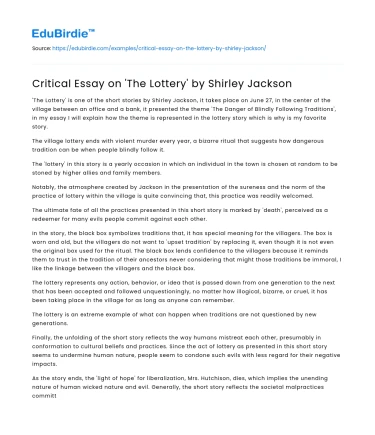'The Lottery' is one of the short stories by Shirley Jackson, it takes place on June 27, in the center of the village between an office and a bank, it presented the theme 'The Danger of Blindly Following Traditions', in my essay I will explain how the theme is represented in the lottery story which is why is my favorite story.
The village lottery ends with violent murder every year, a bizarre ritual that suggests how dangerous tradition can be when people blindly follow it.
Save your time!
We can take care of your essay
- Proper editing and formatting
- Free revision, title page, and bibliography
- Flexible prices and money-back guarantee
The 'lottery' in this story is a yearly occasion in which an individual in the town is chosen at random to be stoned by higher allies and family members.
Notably, the atmosphere created by Jackson in the presentation of the sureness and the norm of the practice of lottery within the village is quite convincing that, this practice was readily welcomed.
The ultimate fate of all the practices presented in this short story is marked by 'death', perceived as a redeemer for many evils people commit against each other.
In the story, the black box symbolizes traditions that, it has special meaning for the villagers. The box is worn and old, but the villagers do not want to 'upset tradition' by replacing it, even though it is not even the original box used for the ritual. The black box lends confidence to the villagers because it reminds them to trust in the tradition of their ancestors never considering that might those traditions be immoral, I like the linkage between the villagers and the black box.
The lottery represents any action, behavior, or idea that is passed down from one generation to the next that has been accepted and followed unquestioningly, no matter how illogical, bizarre, or cruel, it has been taking place in the village for as long as anyone can remember.
The lottery is an extreme example of what can happen when traditions are not questioned by new generations.
Finally, the unfolding of the short story reflects the way humans mistreat each other, presumably in conformation to cultural beliefs and practices. Since the act of lottery as presented in this short story seems to undermine human nature, people seem to condone such evils with less regard for their negative impacts.
As the story ends, the 'light of hope' for liberalization, Mrs. Hutchison, dies, which implies the unending nature of human wicked nature and evil. Generally, the short story reflects the societal malpractices committed by humankind to each other, as though they are ordinary events.






 Stuck on your essay?
Stuck on your essay?

